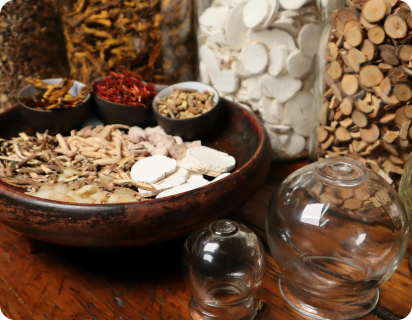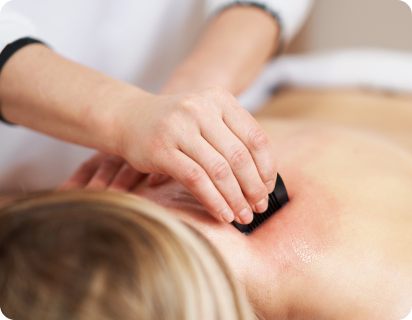Headaches can be debilitating and affect daily life significantly. Traditional Chinese Medicine (TCM) offers a holistic approach to treating headaches, focusing on the root causes rather than just alleviating symptoms. TCM views headaches as a manifestation of imbalances in the body’s vital energy, or “Qi,” along with potential disruptions in blood circulation and organ function. Here, we explore how TCM treats headaches and the various methods involved.
Understanding Headaches in TCM
In TCM, headaches are categorized based on their characteristics, location, and accompanying symptoms. Common types include:
Liver Yang Rising: Characterized by a throbbing pain, often on the sides of the head, accompanied by irritability and stress.
Qi and Blood Deficiency: Presenting as a dull, lingering headache, often associated with fatigue and pale complexion.
Cold or Wind Invasion: Resulting in sharp, sudden pain, usually in the front of the head, often accompanied by nasal congestion.
Phlegm Accumulation: Leading to a sensation of heaviness in the head and possibly dizziness or nausea.
By identifying the type and cause of the headache, TCM practitioners can tailor treatments to restore balance and promote healing.


TCM Treatment Methods for Headaches
Acupuncture
Acupuncture is one of the most well-known TCM practices. It involves inserting thin needles into specific acupuncture points to stimulate the flow of Qi and blood. For headaches, practitioners may target points on the head, neck, and other areas of the body to release tension, alleviate pain, and restore harmony. Research has shown that acupuncture can effectively reduce headache frequency and intensity.
Herbal Medicine
TCM utilizes a variety of herbal formulas to treat headaches based on their underlying causes. Common herbs used include:
- Chrysanthemum: Helps to clear heat and toxins, especially for headaches due to liver yang rising.
- Ginger: Warms the body and helps alleviate headaches caused by cold or damp conditions.
- Angelica Sinensis (Dong Quai): Nourishes the blood and improves circulation, beneficial for headaches related to Qi and blood deficiency.
Practitioners may customize herbal remedies to suit individual needs, ensuring a more personalized approach.
Cupping Therapy
Cupping involves placing special cups on the skin to create suction, which helps increase blood flow and relieve tension. It is often used to address muscle tightness and improve circulation, making it beneficial for tension headaches. By releasing stagnation and promoting relaxation, cupping can alleviate headache symptoms.
Gua Sha
Gua Sha is a technique that involves scraping the skin with a smooth-edged tool. This practice helps to promote blood circulation and relieve muscle tension. For headaches, Gua Sha can be applied to areas around the neck and shoulders to release tightness and improve overall energy flow.
Diet and Lifestyle Recommendations
TCM emphasizes the importance of diet and lifestyle in maintaining health. Practitioners may recommend dietary changes, such as avoiding excessive spicy, greasy, or cold foods, which can exacerbate headaches. Incorporating nourishing foods, staying hydrated, and managing stress through relaxation techniques, such as Tai Chi or meditation, can also help prevent headaches.
Massage Therapy
Tuina, a form of therapeutic massage in TCM, focuses on stimulating acupoints and promoting relaxation. Gentle massage techniques can relieve muscle tension in the head, neck, and shoulders, providing immediate relief from headache symptoms.
Traditional Chinese Medicine offers a comprehensive approach to treating headaches by addressing their root causes and promoting overall well-being. Through acupuncture, herbal medicine, cupping, Gua Sha, dietary adjustments, and lifestyle modifications, TCM practitioners can help individuals find relief from headaches while restoring balance to their bodies. If you’re struggling with headaches, consider exploring TCM as a potential avenue for effective and holistic treatment.
Depression is a complex mental health condition that affects millions of people worldwide. Characterized by persistent sadness, a lack of interest in once-enjoyable activities, fatigue, and difficulty concentrating, it significantly impacts quality of life. While conventional treatment often involves a combination of medication and psychotherapy, Traditional Chinese Medicine (TCM) offers an alternative or complementary approach for managing depression. TCM views health from a holistic perspective, focusing on the balance of mind, body, and spirit. In this article, we’ll explore how TCM approaches the treatment of depression and its underlying philosophy.
Understanding Depression in TCM
In Traditional Chinese Medicine, depression is considered a result of an imbalance of Qi (vital energy) and disruptions in the body’s natural harmony. The root of the condition is often related to disruptions in the functions of key organs such as the liver, heart, spleen, and kidneys, which are seen as responsible for the regulation of emotions and the smooth flow of Qi.
From a TCM perspective, depression can be linked to various underlying patterns, such as:
- Liver Qi Stagnation: The liver is associated with the regulation of emotional energy. When the flow of liver Qi becomes stagnant, it can lead to feelings of frustration, irritability, and sadness.
- Heart Shen (Spirit) Disturbance: The heart is believed to house the “Shen,” or spirit. Disturbances in heart function can lead to anxiety, restlessness, and insomnia—symptoms often associated with depression.
- Spleen Qi Deficiency: The spleen’s role in TCM involves processing nourishment and supporting mental clarity. When the spleen is weakened, it may cause fatigue, low energy, and overthinking, which can exacerbate depressive symptoms.
- Kidney Deficiency: The kidneys are responsible for maintaining vitality and motivation. A deficiency in kidney energy can manifest as apathy, a lack of drive, or a deep sense of sadness.
In TCM, the goal is to identify the underlying cause of the imbalance and use a combination of therapeutic modalities to restore harmony within the body.
TCM Treatment Approaches for Depression
1. Acupuncture
Acupuncture is one of the most well-known practices in TCM and has shown promise in managing depression. By inserting fine needles at specific points on the body, acupuncture aims to unblock stagnant energy and restore the balance of Qi. Specific acupuncture points are chosen based on an individual’s symptoms and underlying TCM diagnosis.
Research has suggested that acupuncture may stimulate the release of endorphins and other neurotransmitters, such as serotonin, which are linked to mood regulation. Acupuncture can also promote relaxation, improve sleep, and reduce anxiety, all of which are crucial in addressing depressive symptoms.
2. Herbal Medicine
Chinese herbal medicine plays a vital role in TCM treatment for depression. Herbal formulas are customized to each individual based on their unique presentation of symptoms. Common herbs and herbal combinations used to treat depression include:
- Xiao Yao San (Free and Easy Wanderer): This classic formula is commonly used to alleviate liver Qi stagnation, promote emotional balance, and reduce stress.
- Chai Hu Shu Gan San: Used to smooth liver Qi and ease tension, it is helpful for those experiencing irritability or frustration.
- Gan Mai Da Zao Tang: Known as the “licorice wheat and jujube decoction,” this formula is often prescribed to nourish the heart, calm the Shen, and alleviate symptoms like anxiety, sadness, and insomnia.
Herbal treatments are tailored to the individual, and the specific formula chosen depends on the root cause of the depression as identified by a TCM practitioner.
3. Qi Gong and Tai Chi
Qi Gong and Tai Chi are gentle exercises that focus on movement, breathing, and meditation. They can help promote the flow of Qi, reduce stress, and improve mood. These practices can be especially beneficial for individuals dealing with depression, as they provide a way to release physical tension while cultivating a sense of calm and emotional well-being.
4. Dietary Therapy
In TCM, diet is considered an important factor in maintaining mental and emotional health. Foods that nourish the spleen and promote the free flow of Qi can be beneficial for those with depression. Warm, easy-to-digest foods like soups and stews are encouraged, while cold, raw foods are minimized as they may impair spleen function.
Foods like ginger, jujube dates, and sweet potatoes are often recommended to promote emotional balance and boost energy levels. Avoiding excess sugar, alcohol, and greasy foods is also advised to prevent stagnation and further imbalance.
5. Cupping and Moxibustion
Cupping and moxibustion are additional therapies that are used to promote circulation and relieve tension. Cupping therapy helps move stagnant Qi, while moxibustion, which involves burning dried mugwort near specific acupuncture points, can help warm and invigorate the body’s energy, making it helpful for conditions involving deficiency or coldness.
Benefits and Considerations
- Holistic Approach: TCM addresses the root cause of depression, considering physical, emotional, and environmental factors, rather than just focusing on symptoms.
- Complementary Treatment: Can be used alone for mild to moderate depression or alongside conventional treatments like therapy and medication for a comprehensive approach.
- Customized Care: Treatments are individualized to suit each person’s needs. Always consult a licensed TCM practitioner to ensure safe and proper care.
- Integrative Use: If taking medication for depression, work with your healthcare provider to ensure safe integration of TCM.
In today’s fast-paced world, stress has become a common part of our daily lives. Whether it stems from work, relationships, or personal challenges, finding effective ways to manage stress is essential for maintaining overall health and well-being. One highly effective method for stress relief is massage therapy.
1. Reduces Muscle Tension
Massage therapy helps to alleviate muscle tension and tightness, which often accumulate due to stress. By applying pressure to specific areas of the body, massage relaxes the muscles and promotes a sense of physical relief. This physical release can translate to a mental release, allowing the mind to unwind.
2. Increases Circulation
Massage stimulates blood flow, which can help deliver oxygen and nutrients to tissues throughout the body. Improved circulation not only aids in physical recovery but also contributes to an overall sense of vitality and relaxation. As blood flow increases, the body can better detoxify and eliminate waste products, further enhancing feelings of well-being.
3. Lowers Cortisol Levels
Studies show that massage therapy can lower cortisol levels—the hormone associated with stress. Elevated cortisol can lead to a host of negative health effects, including anxiety, weight gain, and sleep disturbances. By reducing cortisol, massage helps to restore balance in the body and fosters a more relaxed state of mind.
4. Promotes Relaxation
The soothing nature of massage creates a calming environment that encourages relaxation. The act of being touched and cared for can trigger the body’s relaxation response, leading to reduced anxiety and a sense of comfort. Many people report feeling a deep sense of peace during and after a massage session.
5. Enhances Mental Clarity
By reducing stress and promoting relaxation, massage can also enhance mental clarity and focus. When the mind is less cluttered with stress, individuals often find it easier to think clearly and make decisions. This mental clarity can lead to improved productivity and overall life satisfaction.
6. Fosters Emotional Well-Being
Massage therapy can be a powerful tool for emotional healing. It can help individuals process their feelings and create a sense of connection to their bodies. Regular sessions can foster a greater awareness of bodily sensations, encouraging individuals to become more in tune with their emotional states.
Massage therapy is an effective and holistic approach to relieving stress. By addressing physical tension, promoting relaxation, and enhancing emotional well-being, it offers a multitude of benefits that can contribute to a healthier, more balanced life. Whether you’re dealing with chronic stress or simply need a moment of calm, incorporating regular massage into your self-care routine can be a transformative experience.
 cc@yst.sg
cc@yst.sg


